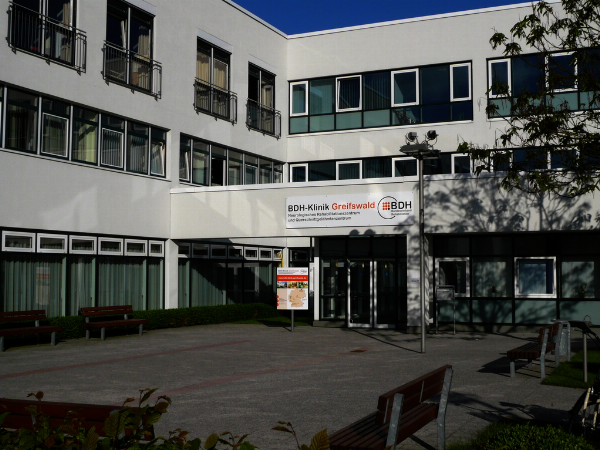BDH-Klinik Greifswald gGmbH

Karl-Liebknecht-Ring 26a
17491 Greifswald
Phone:
03834-871-0
Fax:
03834-871-102
Mail:
ed.dlawsfierg-kinilk-hdb@ofni
ed.dlawsfierg-kinilk-hdb@ofni
ed.dlawsfierg-kinilk-hdb@ofni
- Number of beds: 66
- Number of specialist departments: 2
- Number of inpatient cases: 954
- Number of partial inpatient cases: 123
- Hospital owners: BDH Bundesverband Rehabilitation e.V.
- Type of provider:
- Other Information: gemeinnützig
Further information
- External quality assurance according to state law
No participation
- Quality of participation in the Disease Management Programme (DMP)
No participation
- Implementation of the minimum quantity agreement
No participation
- Implementation of resolutions of the Federal Joint Committee on quality assurance (G-BA)
No participation
- Clarifying chat completed: no
- Clarifying chat not completed: no
- No participation in clarifying chat: no
- Notification of non-fulfilment of nursing care not made: no
| Number | Group |
|---|---|
| 5 | Medical specialists (m/f) , psychological psychotherapists (m/f) and child and adolescent psychotherapists (m/f) who are subject to the obligation to undergo further training* |
| 5 | Number of medical specialists (m/f) from no. 1 who have completed a five-year period of further training and are therefore subject to the obligation to provide evidence |
| 5 | Number of those persons from no. 2 who have provided proof of further training according to Article 3 of the G-BA regulations |
According to Section 4 (2) of the Quality Management Guideline, facilities must provide for the prevention of and intervention in cases of violence and abuse as part of their internal quality management. The aim is to prevent, recognise and respond appropriately to abuse and violence, particularly against vulnerable patient groups such as children and adolescents or people in need of help, and also to prevent it within the facility. The respective procedure is aligned with the size of the facility, the range of services and the patients in order to define customised solutions for sensitising the teams as well as other suitable preventative and interventional measures. These may include information materials, contact addresses, training/education, codes of conduct, recommendations for action/intervention plans or comprehensive protection concepts.
- Is a protection concept in place? No
- No care for children and young people
- Drug commission
Training of employees on AMTS related topics
Electronic support for the admission and anamnesis process (e.g. import of patient master data or medication plans, use of a drug knowledge database, input screen for drugs or anamnesis information)
- Admission to hospital, including anamnesis
; Instruments and measures are presented for determining the old medication (drug history), the subsequent clinical assessment and the switch to the medication available in the hospital (house list), as well as for documenting both the patient's original medication and that for hospital treatment adapted medication.
- Medication process in the hospital
In this context, the following sub-processes are assumed as examples: drug history - prescription - patient information - drug delivery - drug use - documentation - therapy monitoring - result assessment. Instruments and measures for safe medication prescription can be presented, e.g. B. in terms of readability, clarity and completeness of the documentation, but also in terms of area of application, effectiveness, benefit-risk ratio, tolerability (including potential contraindications, interactions, etc.) and resource considerations. Information can also be provided to support reliable medication ordering, delivery and use or administration.
- Discharge
In particular, the measures taken by hospitals can be presented to ensure that information on drug therapy is structured and passed on to doctors and physicians providing further treatment, as well as the appropriate provision of patients with drug information, medication plans and medications. Drug prescriptions are made.
Job
Explanation
Greifswalder 3-Phasen-Modell, eine Zuammenarbeit mit der Universitätsmedizin Greifswald, der BDH-Klinik Greifswald und dem BerufsBildungsWerk Greifswald
FL05 - Participation in multi-centre Phase I/II studies
Explanation
Explanation
Studentenunterricht (Neurologie, Psychologie), Famulaturen
FL07 - Initiation and management of uni-centric/multi-centric clinical/scientific studies
Explanation
FL06 - Participation in multi-centre phase III/IV studies
Explanation
FL01 - Lectureships / teaching posts at colleges and universities
Explanation
Explanation
Update Neurorehabilitation, Hippocampus-Verlag
Explanation
Promotionsvorhaben Dr. med.
Training in other healing professions
Comment
In Zusammenarbeit mit der Berufsfachschule Greifswald, Praktika aus anderen Berufsschulen sind möglich
Comment
In Zusammenarbeit mit unterschiedlichen Schulen. Der praktische Teil der Ausbildung kann in unserer Klinik absolviert werden.
Comment
In Zusammenarbeit mit der Berufsfachschule Greifswald, Praktika aus anderen Berufsschulen sind möglich
Comment
In Zusammenarbeit mit unterschiedlichen Schulen. Der praktische Teil der Ausbildung kann in unserer Klinik absolviert werden.
Comment
In Zusammenarbeit mit unterschiedlichen Schulen. Der praktische Teil der Ausbildung kann in unserer Klinik absolviert werden.
Comment
In Zusammenarbeit mit unterschiedlichen Schulen. Der praktische Teil der Ausbidung kann in unserer Klinik absolviert werden.
Comment
In Zusammenarbeit mit der Berufsfachschule Greifswald
Ulrike Abel
BDH- Kreisverband Greifswald
Karl-Liebknecht-Ring 26a
17491 Greifswald
Phone:
03834
-871-100
Mail:
ed.dlawsfierg-kinilk-hdb@leba.u
Katja Pahl
Qualitätsmanagementbeauftragte
Karl-Liebknecht-Ring 26a
17491 Greifswald
Phone:
03834
-871-232
Mail:
ed.dlawsfierg-kinilk-hdb@lhap.k
Dr. med. Torsten Stein
Beauftragter der obersten Leitung (BoL)/ Ärztlicher Direktor
Karl-Liebknecht-Ring 26a
17491 Greifswald
Phone:
03834
-871-201
Mail:
ed.dlawsfierg-kinilk-hdb@deatairaterkes
Dr. med. Torsten Stein
Ärztlicher Direktor
Karl-Liebknecht-Ring 26a
17491 Greifswald
Phone:
03834
-871-201
Mail:
ed.dlawsfierg-kinilk-hdb@deatairaterkes
Ulrike Abel
Vorsitzende BDH Kreisverband Greifswald
Karl-Liebknecht-Ring 26a
17491 Greifswald
Phone:
03834
-871-100
Mail:
ed.dlawsfierg-kinilk-hdb@leba.u
17491 Greifswald
Phone:
03834-871-0
Fax:
03834-871-102
Mail:
ed.dlawsfierg-kinilk-hdb@ofni
Mareile Otto
Pflege- und Therapieleitung
Karl-Liebknecht-Ring 26a
17491 Greifswald
Phone:
03834
-871-300
Mail:
ed.dlawsfierg-kinilk-hdb@otto.m
Dipl.-Betriebswirt Roger Gierczak
Geschäftsführer
Karl-Liebknecht-Ring 26a
17491 Greifswald
Phone:
03834
-871-101
Mail:
ed.dlawsfierg-kinilk-hdb@fgtairaterkes
Dipl.-Betriebswirt Roger Gierczak
Geschäftsführer
Karl-Liebknecht-Ring 26a
17491 Greifswald
Phone:
03834
-871-101
Mail:
ed.dlawsfierg-kinilk-hdb@fgtairaterkes
Dr. med. Torsten Stein
Ärztlicher Direktor/ Chefarzt
Karl-Liebknecht-Ring 26a
17491 Greifswald
Phone:
03834
-871-301
Mail:
ed.dlawsfierg-kinilk-hdb@deatairaterkes
IK: 261300700
Location number: 773510000
- http://www.bdh-reha.de Der BDH ist die größte deutsche Fachorganisation für die Rehabilitation neurologischer Patienten
